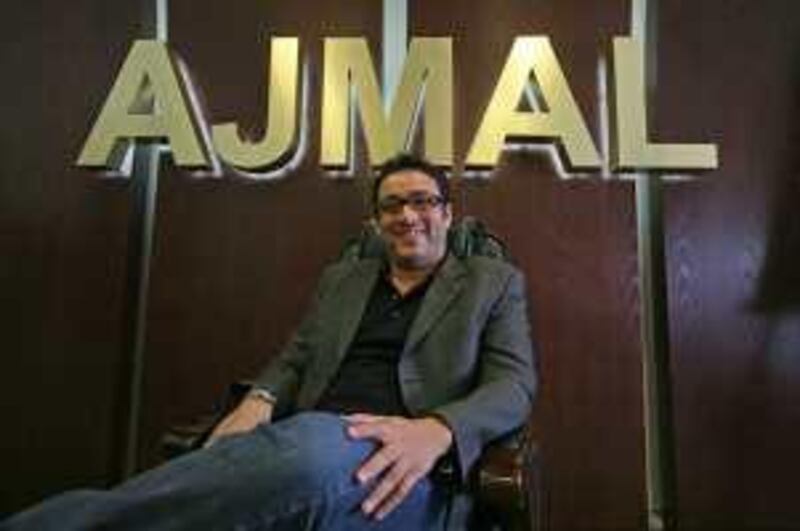At the helm of a family business sits Abdulla A Ajmal. He is a consummate optimist who carries on a family tradition of producing what are arguably the best known and best selling locally produced fragrances in the Middle East, Ajmal Perfumes. In 2007, this company enjoyed a turnover of US$145 million (Dh532m) in the countries of the Gulf Cooperation Council. Last year, that figure rose by US$55m, even as economies around the world were beginning to decelerate. Recession? Mr Ajmal just invested more than US$5m in research and development. Global financial meltdown? Across the region, Ajmal has established more than 118 retail outlets, with an additional 1,200 dealers, and soon there will be a total of 200 Ajmal stores. Economic downturn? Ajmal Perfumes is expecting to soon have a presence in 30 countries, primarily through flagship stores in the Middle East, Asia and Europe in the near future.
Most any entrepreneur would be howling with delight at such stats. They suggest a well-run business; they suggest attention to every element of the bottom line; they suggest that employees are expected to adhere to the adage that a company's finances are, in the aggregate, a reflection of the way its employees manage their personal finances. What does that mean? Mr Ajmal's answer, in words carefully chosen and carefully delivered: "I have always tried to follow a 60:40 split, with 60 per cent going toward savings and the rest towards spending. I want to enjoy my life and I don't want to do it when I turn 60. I want to be secure as well knowing that I am not just throwing money away. I think it is very important to strike a healthy balance between spending and saving. I know that is such a vague statement, as each individual's balance is very different, but in my experience I have found that the 60:40 ratio works well for me."
Some might see a boastful nature in that answer. But Mr Ajmal, who was educated in Britain and represents the third generation of Ajmal to run the family business, doesn't boast. So what, he's asked by his lunch companion, explains his success? He has enough media savvy not to respond right away, but finally says: "In the Middle East, Ajmal is well known for its quality fragrances and is recognised as a symbol of trust. Ajmal creates and invents its own perfumes by trying out various combinations. There are more than 300 compositions of fragrances with Ajmal Perfumes.
"Oriental and woody kinds of fragrances are popular at the moment, along with the classics such as the floral and the chypre fragrances. This puts Ajmal in a place where they can say that they cater to any kind of taste." This isn't bravado. Facts, after all, are facts. It's hard for retail companies to fudge figures. Fragrances fly off Ajmal shelves or they don't. It's hard to catch this businessman in any mood set save one that's relentlessly optimistic.
What's striking about his optimism isn't just because Mr Ajmal - who's in his mid-thirties - is such an enthusiastic brand ambassador for the perfumes, colognes and accouterments that his eponymous 60-year-old company manufactures. Ajmal Perfumes was founded in the early 1950s by Haji Ajmal Ali in Assam, India. Ajmal began as a modest commodity trader dealing primarily in Agarwood extracted from Aquilaria trees.
This trade over the years saw the business grow from a single commodity trader into a regional powerhouse creating the finest in terms of fragrances and catering to the entire gamut of olfactory tastes. Haji Ajmal Ali knew that fragrances were as much a part of the Arab culture as social values such as honesty and probity. Subscribing to these values is anything but notional for Mr Ajmal. "You have to be absolutely true to yourself, work hard and live and let live," he says. "To me, creativity is an important aspect, and that cannot be fostered unless you have an open environment. That is why I truly believe in the 'live and let live' ethos."
Something that comes through plainly, clearly and consistently during our conversation is that he's unabashedly optimistic about the financial future of Dubai and the UAE. He's optimistic regardless of the global financial meltdown. "I think the current situation will not stay for too long," he says. "According to how I read the current market scenario I think we will see the return of some amount of security and confidence in the market and consumer towards the end of the year. I don't think it will go back to the way it was - that will take a couple of years - but the process I feel, and hope, will be up and running by the last quarter this year."
He's sufficiently sharp to share with his listener some trenchant observations about the circumstances leading to the financial crisis. "I hope that people do what they know best and not get into something they don't thoroughly know about," he says. "I remember the time when the stock market was at its peak; there were people I knew who were picking companies based on the alphabets that their names started with. This was the limit it had reached."
Mr Ajmal is not the sort to preach. But toward the end of lunch, he slipped this in: "I think it is a good wake-up call," he explains. "This is the first recession that we have seen in this region, and although it is not as bad as other times in history, it is still bad enough to push people into panic mode. We should learn from our mistake. We cannot be frivolous and cavalier in terms of our investment attitudes. We need this lesson to be learnt that sensibility will help us avoid such circumstances in the future."
Pranay Gupte, a journalist and author, is co-editor of the forthcoming Global Emirates: An Anthology of Tolerance and Understanding, distributed by Motivate Publishing






